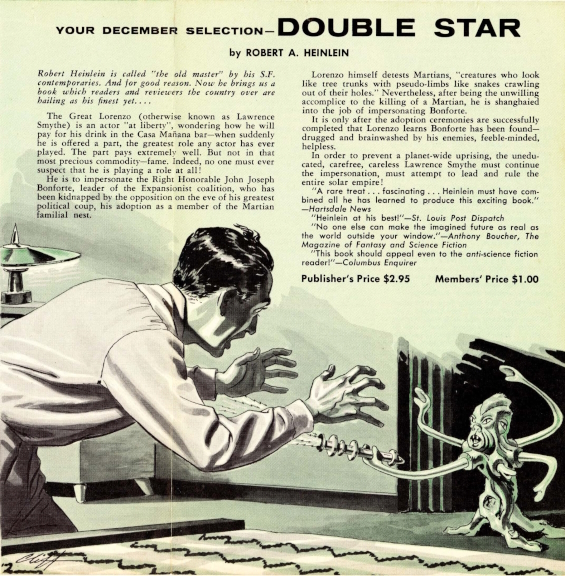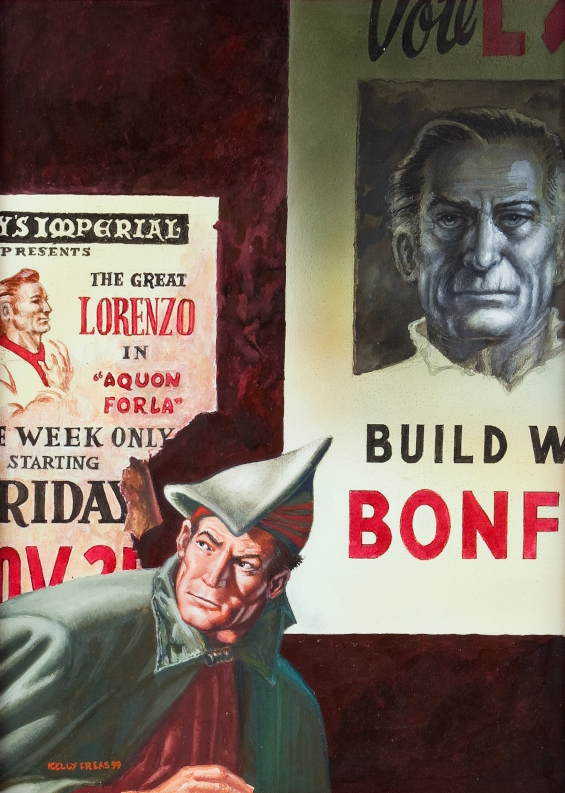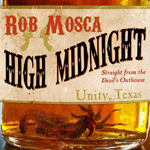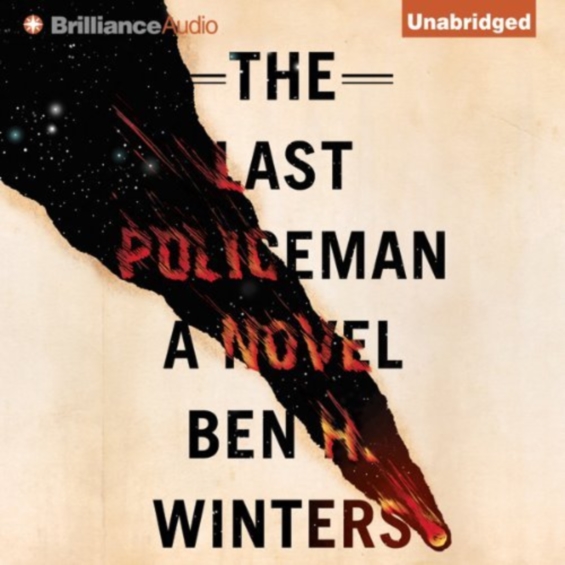 The SFFaudio Podcast #387 – Jesse, Paul, and Julie Davis talk about Double Star by Robert A. Heinlein.
The SFFaudio Podcast #387 – Jesse, Paul, and Julie Davis talk about Double Star by Robert A. Heinlein.
Talked about on today’s show:
Astounding Science Fiction, February, March, April 1956, Scaramouche by Rafael Sabatini, making connections, good job, 100% first person, mistaken shallow perception -> deeper understanding, The Prince And The Pauper by Mark Twain, The Prisoner Of Zenda by Anthony Hope, the LibriVox audiobook levelated and made beautiful, humour, light, twitter conversation “bland” vs. “light”, bubbles along, swashbuckler, Heinlein is that you?, this is a book about politics, here are all the political systems, making fun of Heinlein is very easy, bullheaded, popular quotes, one character sitting in a room and another character walks in and says “no”, refusing, listen to me young man I am the old man and I know best, Heinlein’s negotiation tactic is brinkmanship, it’s not your turn, more about politics and racism and perception (than SF), I think my father would be proud that my life is a work of art, from Lorenzo Smythe’s POV, a failed actor, not a loser, penniless, working as a stripper, the illustrations from the serialization, this is not in the book, non-info-dump info-dumps, Coriolis vs. Coriolanus, narrator Lloyd James, in the voice of Bonforte, a better person or politician than Bonforte, remember Bill, a bunch of people talking on a spaceship, not a juvenile, Hitler, Satan, assuming the attributes of divinity, a politically astute novel, Heinlein’s earlier jobs, owning a silver mine, running for political office, being in the room, libertarian, California state assembly 1948, no prizes for second place in politics, an British parliamentary system, William King Of The Dutch and Emperor of The Earth, Queen Elizabeth II (former Empress), head of state vs. head of government, when you go to visit Lincoln, Lincoln is a God in the temple, larger than life, a Greek temple, The Simpsons, political corruption, the Jefferson memorial, you went to Lincoln first!, understanding why the book is resonant, the emperor of Known Space likes playing with trains, meeting the Queen, no statue for John Major, 100 units in pocket, politics as a team sport vs. saviors, taking care of the day-to-day crap, Primary Colors (1998), John Hightower, I take that on so you can get something done, taking on the mantle of the President, there’s no special charm to Prime Ministers (usually), confidence votes, the show must go on, “always take sides”, the “poltroons”, a second look, the title, human = martian, equality for all, doubling, Lorenzo Smythe = Lawrence Smith, an instinctual hate of the aliens, squiggly arms, hating aliens is racism, the aliens are just Texans, the life wand, induction into the Martian clan, introduction at William’s court, Prof. Eric S. Rabkin’s lecture on Heinlein, Stranger In A Strange Land, the TV Tropes entry on Double Star, orange morality and blue morality, wise man and straw man, showing up late, a cycle humans keep falling into, a 1970 Double Star cover, a modern art prize (2000 Turner Prize) controversy, Stuckists and Sad Puppies, scale matters (?), Marcel Duchamp, “artist”, “Fountain“, ponies?, movements for and against, Paul’s biased POV, taking umbrage, Rabid Puppies, SF is overrun with leftists (?), “no award”, like every awards thing, TOR Books, inclusionary authors, Larry Correia’s books, U.S. elections, trying to destroy the system, SJW = social justice warrior, what’s fundamentally interesting about Double Star is that we’re in on a massive fraud to subvert democracy, Humans First, for Jefferson’s sake, takes the facts the same story from the other side: a response book, I don’t want people walking around with open carry for their “life wands”, no guns allowed signs in Texas churches, The Good Wife, the Hillary Clinton – Bill Clinton story, telling lies in public, seeing politics from up close and personal, The West Wing, Dave (1993), a little humour there, “sick”, the wife, a little bit inverted, interesting parallels, taking the role and making it better, he’s better at Bonforte than Bonforte was, to be an actor you have to be every man, I’d like Jack the Ripper, an unreliable narrator, the theatrical way he describes himself, he thinks it’s all true, hyperbolized in some ways, acting with a burst appendix, biology can be conquered by will, ripping off the novel/plot, Moon Over Parador (1988), The Magnificent Fraud (1939), we are rooting for the hero, who is ripping off who?, it depends on what you do with it, To Be Or Not To Be (1942), To Be Or Not To Be (1983), the new Ben Hur, going by Hugos or awards or contests, Connie Willis, the Oscars, Guardians Of The Galaxy, two CG characters and it doesn’t suck?, being burned by award winners, Theeb, a disillusioning moment, boycotting and protesting, N. K. Jemisin, a Heinlein letter, race relations, the lucky ones were the ones that were enslaved, the inciting incident, Heinlein was the most liberal of SF writers, more left than Wells, a Missouri dude who was always into pushing fellow humans, “huh, he’s Filipino”, “he’s not even American!”, Heinlein’s always pushing talking heads that turn out to be diverse, Farnham’s Freehold, time travel, Blacks have taken over the world, castrating the son, cannibals, a less PC version of Planet Of The Apes, the Pierre Boulle book is a comedy (satire), Pierre Boulle, the ending of the Planet Of The Apes is a comedy, sexism, Charlton Heston in the Civil Rights movement, for both martians and men, making peace amongst all, here’s my problem, get in the system, The Fifth Season, where’s the idea?, where’s the idea?, Cory Doctorow does Heinlein in Little Brother, paint by numbers, Robert J. Sawyer, that shows the diversity you find in Toronto, the magic system is based on the manipulation of earth (geological) forces, it’s anti-racist, it’s important to be seeing doing it, more Bonforte than Bonforte, more Heinlein than Heinlein, the one female character, Heinlein doesn’t understand women, criticizing Dickens, he’s terrible at writing other humans, his villains are stick-figures, the old man, the young looking older woman, and the young narrator who has to be taught, transcending limitations, he’s bad at women who aren’t from the 1940s, violence towards women was an everyday thing, assault with violence, not that I laid a finger on her, proper and sensible hitting, the way people talked back then, from the wife-beating 1950s, acting like this guy, no no no no no, totally unrealistic, a six hour book, SFFworld.com, Double Star was written in three weeks, creep in.




















Posted by Jesse Willis




 Clean Sweep
Clean Sweep High Midnight
High Midnight


